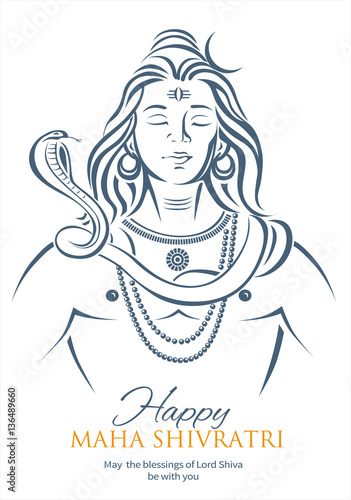Maha Shivratri, which literally translates to "great night of Shiva" is a Hindu festival largely celebrated in India as well as in Nepal. The night of the worship of Lord Shiva, occurs on the 14th night of the new moon during the dark half of the month of Phalguna. It falls on a moonless February night, when Hindus offer special prayer to the lord of destruction. Shivratri (In Sanskrit, 'ratri' = night) is the night when he is said to have performed the Tandava Nritya-- the dance of primordial creation, preservation and destruction
Maha Shivratri is a Hindu festival which is celebrated by people following Hinduism in India. People often fast on the night of Shivratri and sing hymns and praises in the name of Lord Shiva. Hindu temples across the country are decorated with lights and colorful decorations and people can be seen offering night long prayers to Shiva Lingam. Woodapple leaves, cold water and milk are offered to the Shiva Lingam on this day as they are believed to be Lord Shiva's favorite
Origin of Shivratri
According to the Puranas, during the great mythical churning of the ocean called Samudra Manthan, a pot of poison emerged from the ocean. The gods and the demons were terrified, as it could destroy the entire world. When they ran to Shiva for help, he, in order to protect the world, drank the deadly poison but held it in his throat instead of swallowing it. This turned his throat blue, and because of this he came to be known as 'Nilkantha', the blue-throated one. Shivratri celebrates this event by which Shiva saved the world
A Festival Significant for Women:
Shivratri is considered especially auspicious for women. Married women pray for the well-being of their husbands and sons, while unmarried women pray for an ideal husband like Shiva, who is the spouse of Kali, Parvati and Durga. But generally, it is believed that anyone who utters the name of Shiva during Shivratri with pure devotion is freed from all sins. He or she reaches the abode of Shiva and is liberated from the cycle of birth and death.
It is believed that the people who fast on this night and offer prayers to Lord Shiva bring good luck into their life. The most popular Maha Shivratri celebrations take place in Ujjain, believed to be the place of residence of Lord Shiva. Large processions are carried out throughout the city, with people thronging the streets to catch a glimpse of the revered idol of Lord Shiva
"Om Namah Shivaya!"
All through the day, the devotees keep severe fast, chant the sacred Panchakshara mantra "Om Namah Shivaya", and make offerings of flowers and incense to the Lord amidst ringing of temple bells. They maintain long vigils during the night, keeping awake to listen to stories, hymns and songs. The fast is broken only the next morning, after the nightlong worship. In Kashmir, the festival is held for 15 days. The 13th day is observed as a day of fast followed by a family feast.
Maha Shivratri is a Hindu festival which is celebrated by people following Hinduism in India. People often fast on the night of Shivratri and sing hymns and praises in the name of Lord Shiva. Hindu temples across the country are decorated with lights and colorful decorations and people can be seen offering night long prayers to Shiva Lingam. Woodapple leaves, cold water and milk are offered to the Shiva Lingam on this day as they are believed to be Lord Shiva's favorite
Origin of Shivratri
According to the Puranas, during the great mythical churning of the ocean called Samudra Manthan, a pot of poison emerged from the ocean. The gods and the demons were terrified, as it could destroy the entire world. When they ran to Shiva for help, he, in order to protect the world, drank the deadly poison but held it in his throat instead of swallowing it. This turned his throat blue, and because of this he came to be known as 'Nilkantha', the blue-throated one. Shivratri celebrates this event by which Shiva saved the world
A Festival Significant for Women:
Shivratri is considered especially auspicious for women. Married women pray for the well-being of their husbands and sons, while unmarried women pray for an ideal husband like Shiva, who is the spouse of Kali, Parvati and Durga. But generally, it is believed that anyone who utters the name of Shiva during Shivratri with pure devotion is freed from all sins. He or she reaches the abode of Shiva and is liberated from the cycle of birth and death.
It is believed that the people who fast on this night and offer prayers to Lord Shiva bring good luck into their life. The most popular Maha Shivratri celebrations take place in Ujjain, believed to be the place of residence of Lord Shiva. Large processions are carried out throughout the city, with people thronging the streets to catch a glimpse of the revered idol of Lord Shiva
"Om Namah Shivaya!"
All through the day, the devotees keep severe fast, chant the sacred Panchakshara mantra "Om Namah Shivaya", and make offerings of flowers and incense to the Lord amidst ringing of temple bells. They maintain long vigils during the night, keeping awake to listen to stories, hymns and songs. The fast is broken only the next morning, after the nightlong worship. In Kashmir, the festival is held for 15 days. The 13th day is observed as a day of fast followed by a family feast.

No comments:
Post a Comment